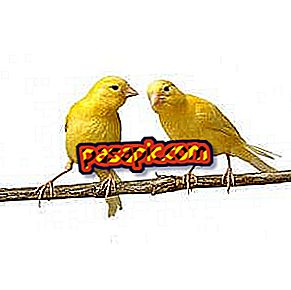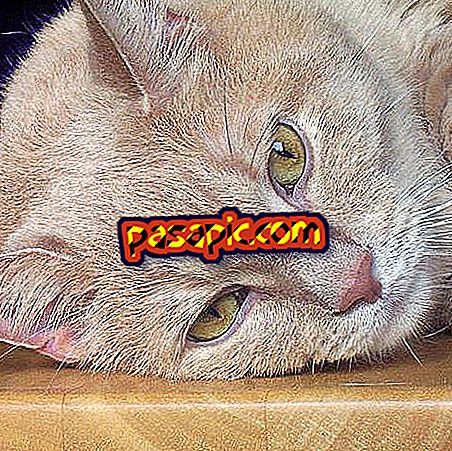Why my turtle does not eat - discover all the reasons

Although turtles generally have a well-developed appetite, there may be times when they are inappetent or reduce the amount of food they want to eat. Have you found yourself in this situation? If the answer is affirmative, take the following article from where we give you the answer to the question: why does not my turtle eat? Changes in temperature, alteration of their environment or habitat or health problems are some of the reasons why your turtle has left behind its voracity. Discover it below!
Turtles, reptiles with appetite
Turtles are reptiles characterized by the presence of a shell, an element that helps them protect their organs. To the naked eye, we can only observe the head, legs and tail, since the rest of the body is covered by the shell. We can distinguish between two large groups of turtles, classified according to their habitat. Thus, there are terrestrial and aquatic ones. Many of them have become pets that we can find in some homes.
If we talk about symbology, it should be noted that the turtles reflect the slowness, due to their speed during travel. However, this same characteristic recognizes them as one of the longest living, patient and wise animals. But if turtles are characterized by something, it is because of their great appetite. They devour anything that is put before them. Have you noticed that your little turtle has stopped eating, feels unappetizing or has reduced the amount of food eaten? If so, it is convenient to be alert, because your pet could be suffering from some ailment that you will have to solve. Below, we present the most common causes why your turtle barely eats.
Main causes of a turtle not eating
The symptoms of inappetence in the turtles are an indicator that the animal is going through a complicated moment. You have to be alert and watch your behavior, since stopping eating could be due to some disease, from constipation to other problems in your digestive system. If you notice that your turtle has stopped eating as usual, it is best to take it to a veterinarian who can verify, for sure, what is the origin of this sudden change in your diet. However, you should know that the causes of this are diverse and varied. We present the most common:
Monotonous diet
Often, the lack of appetite of the turtles can be due to repetition, that is, eating always the same can lead to boredom, so the stop eating is nothing more than a resource to attract attention and alert your monotonous diet. It is important that you vary your diet slightly from time to time to maintain your appetite. In the following articles we show how to feed the water turtles and how to feed the land turtles.
Sudden changes
Sudden changes can always cause your turtle to stop eating for a while. The most frequent changes are those of temperature, which can affect you directly, especially in winter. Think that turtles are reptiles that hibernate, so it is normal to stop eating or reduce the amount of daily food intake between three and four months. In this case, there is no need to worry, since it is a natural process. Once the period of hibernation has ended, the turtle will eat again as usual.
Another sudden change that can directly influence how your turtle eats is the change of aquarium. If you decide to change your pet from the habitat to which you are accustomed, you could cause a shock. This can have an effect on your habitual behavior, so you may not eat as usual for a few days. Think that in front of this change, the animal will take a few days to recover and recover its usual routines. In this case, there is no strong cause for concern.
Diseases
In more extreme cases, the turtle's lack of appetite may be due to the fact that the turtle is sick. The most frequent diseases are stress motivated, for example, by sudden changes such as those mentioned above, constipation, that is, the difficulty of evacuation that can interfere with normal eating, digestive problems or even pneumonia. If your turtle is not hibernating, or has not undergone a sudden change in its habitat or the temperature of it, you should resort to a veterinarian to give you the right solution for your turtle to return to eating regularly.
Parasites
As with many other pets, it is important to maintain the good health of your turtle and ensure that the parasites are away from it. These small bugs can cause lack of appetite and directly affect the way the tortoise eat. Therefore, it is recommended to deworm your pet periodically.

Recommendations to care for a turtle
If your little turtle is going through a bad time and this fact is being reflected in your diet, take note of the following recommendations that will help you improve your condition and regain your appetite.
- Balance diet. Try to include some raw meat during the first year and then try to get the turtle to eat some seafood frequently to give it a good amount of protein. Try not to exceed the amounts.
- When winter comes and so you do not notice the oscillation of temperatures between seasons, you can place the aquarium near a radiator. In this way, you will help the temperature to be constant. Although it will continue to hibernate, it will not be so cold and, therefore, it will not take advantage of its food reserves as much.
- After hibernation, try to make your turtle eat little by little, slowly introducing the amount of food and avoiding overfeeding.
- Do not hesitate to visit the veterinarian in case the previously commented conditions are not met, such as change of temperature or aquarium.


